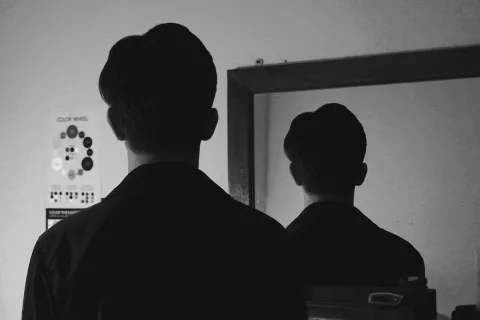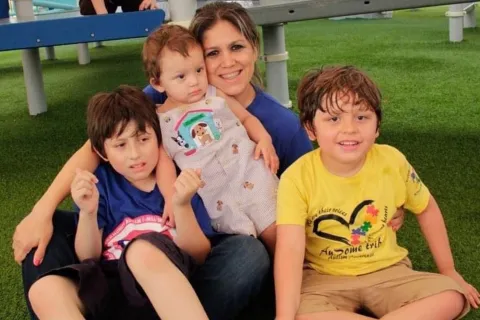Meet Martha
When Martha’s son, Josh, was growing up, Martha faced many challenges finding him the services and supports he needed to overcome his speech delay and behavioral challenges. Now, at age 21, Josh has grown into a bright, empathetic and motivated young man who is in a committed relationship and is pursuing a career in IT.
In this special Mother’s Day Q&A, Martha reflects on her son’s journey and the ways that raising him has impacted her life.
Can you tell me a bit about your son and his autism journey?
Josh was diagnosed with a speech delay at 2.5 years old, but he wasn’t officially diagnosed with autism until he was 8. He had a great deal of frustration because he wasn’t able to express himself. He started getting speech and occupational therapy when he was 2.5 and made terrific progress.
After his autism diagnosis, Josh went from a general education class to a more restricted environment, and he was doing well until puberty started to hit around 12 or 13. He became non-compliant and was diagnosed with oppositional defiance disorder (ODD) in addition to his autism and ADHD.
He was very bright and verbal, but had a difficult time complying and was a rigid black-and-white thinker. At 14, his behavior became so challenging that he had to go to a residential school because he needed a very highly structured therapeutic environment. I saw him every weekend, either at home or in school, and he came home for holidays and for part of the summer which kept our relationship strong.
While at the residential programs, he had a chance to be more socialized. He made good friends who he’s still really close with now. He graduated with his Regents diploma and he was able to use his coping skills to function much more successfully.
After graduation, he went off to a neurodiverse college for a year. That was incredibly stressful for him—they didn’t have the supports they purported to have for him. Then the pandemic happened, so he came home and did some online courses. Now, we’re in the process of doing job coaching and trying to figure out how to proceed with an online IT class. He’s decided that’s what he wants to do. He’s working with a wonderful job coach, but the progress is slow.
To be honest, Josh’s journey has been challenging for both of us. Not every program I identified was the right fit. I think growing up, he felt different and I think that’s affected his self-confidence.
I'm proud to say that last year, Josh fell in love and has been in a serious committed relationship with a lovely person. He's very motivated to succeed professionally, and I know he will. I’m aware that this process will take some time, but I have total confidence that he will find his way with his own motivation and my support.
How has Josh’s autism impacted your experience as a mother?
It has been very difficult, especially as a single mom. Josh and I returned to New York to be close to family after living out of state, and I had a great deal of difficulty securing supports, services and the best educational placement for him. But little by little, we found our way.
It’s been a very isolating journey being a mother of an autistic child because there’s such a lack of awareness and acceptance about autism in the world. All of that has required tremendous fortitude, supported by enormous love.
I have been fortunate that I have a very supportive family and I am very grateful to them. It’s definitely gotten easier as Josh has matured and after he has received so many supports, services and therapies—and my unconditional love.
What is the most rewarding thing about being Josh’s mom?
It’s been rewarding to see him grow, develop and blossom into a young man. He has done so much work on himself and continues to persevere. His inner strength is incredible and I’m so deeply proud of him.
What does Mother’s Day mean to you?
For me, Mother’s Day is about celebrating having a remarkable young man. I think he’s a special, complex, loving and unique human being, and I’m proud to be his mother.
What advice would you give to other mothers of children with autism?
What’s really important is to identify your child’s strengths and to support them to follow their dreams. Try to seek out support wherever you can, whether it’s in a support group, friends or family.
Listen to your heart. If you feel like a situation isn’t working, don’t be afraid to change. The process of finding the right fit for your child is ever-evolving, so never stop looking for what could benefit your child. Give the child as much support, services, love and understanding as you can, and they will flourish.








